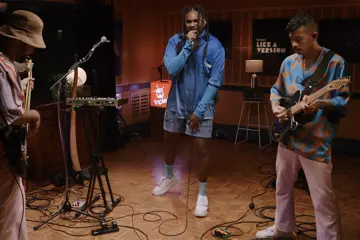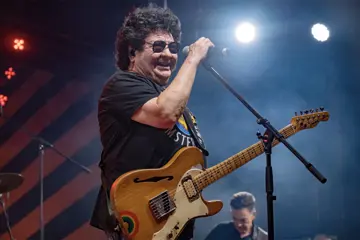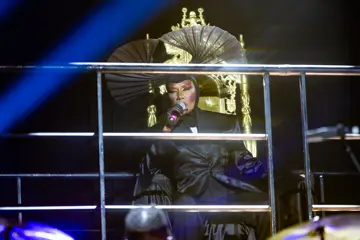 Afrika Bambaataa
Afrika BambaataaHip hop has been played like a 40-year game of broken telephone. Through misinterpretation, it has fallen to a predisposed term for a rap industry. Like the voice of God himself, the legendary Afrika Bambaataa Kahim Aasim speaks only of the gospel in a tone befitting the mythical status of a founding father. While DJ Kool Herc was amassing his Herculoid sound system at Cedar Park, down south, Aasim was transforming rioting gangs of the Bronx into battling participants of what he and Keith 'Cowboy' Wiggans would soon coin as hip hop. The revered and followed DJ was a born leader, but before Aasim was to become a much fabled chunk of music history, he would command a strong authority over the warring streets of South Bronx. He could storm through any neighbourhood to battle another DJ. The myths written of him are staggering and grow through the eons of time. He has been named 'Master Of Records', a title awarded for having one of the world's largest record collections, started at age 4. His name has been incorrectly recorded online numerous times and when asked of a recent birthday, and how old he felt, he replied coyly, “The whole month of April is my birthday,” and, “I'm as young as a newborn flower and I'm as old as the sun, moon and stars.”
By 1975, Aasim had built up his stockpile of records and with the strength and numbers of the Zulu Nation, held down some of the biggest block parties the Boogie Down had ever seen. Next came Grandmaster Flash who would redefine the wheels of steel. Then as call-and-response MCs became recording artists, most DJs fell off. The industry supplanted them for studio music. Aasim explains how he managed to survive the cull after Grandmaster Flash was pushed off The Message.
“That's the situation where the devils behind the record business tell the MCs they don't need the DJ. I was one of the DJs that made sure I stayed involved in any way,” he laughs. “I kept my work on tour with them and kept my name on the record. In a lot of other groups the MCs became the stars and had left the DJs behind.
“There will always be five key records that will be played over and over again to mark the history of hip hop. They are Kurtis Blow's The Breaks, Sugar Hill Gang's Rapper's Delight, Grandmaster Flash's Wheels Of Steel, Melle Mel's Message and Planet Rock (with The Soulsonic Force),” lists Aasim with authoritative measure, the last of which was released in 1982 and cost $800 for Tommy Boy Records. Here, Aasim's message was to bridge peace between the Blacks, Latinos and punk rocker gangs, but after producer Arthur Baker gave it a makeover with German act, Kraftwerk, the record sold over 650,000 copies and made a significant splash outside of not only the Bronx, New York but across Europe and the world.
Don't miss a beat with our FREE daily newsletter
“Planet Rock took it to where people who were from out of town and really hadn't been exposed to the hip hop culture because of the electro-funk sounds and techno-pop style that was happening at the time. That's what people were really having a good time to. Then this fresh new music started popping up all around the world. People started poppin' and breakdancing, rapping and graffitiing places. That's why I kept travelling from outside the city and to country to country to try and make sure that's happening. A lot of people think it just blew up overnight. It didn't work like that. We really had to push it from town to town and different countries, all across Europe and then back to the United States. We worked hard at playing in small cafes, park jams, little back-end record stores, wherever and whenever until it really caught on.”
Throughout Aasim's entire recording career, his music reads like a well-stamped, dog-eared passport. From the European house music attached to Planet Rock, the 'Godfather of Hip Hop and Funk' has travelled the world in search of the perfect beat. When he left the early constraints of Tommy Boy Records, “I was doing all this crazy music with Celluloid and other labels.
“I take people on a music journey,” emphasises Aasim. “I wasn't one of these DJs or artists that just sit in the United States and go with the progression of where the radio takes them. I liked to travel and even more so I liked music. So in Spain I recorded with a group, we recorded a song called Feel The Vibe and it was bilingual. In Italy I recorded Street Happyness with [Enzo Avitabile]. Then I met with John Lydon and recorded World Destruction with Time Zone, and then I moved on to Africa and Greece and recorded with other groups and went by a different name, move on again and create more music with George Clinton and Parliament Funkadelic and with James Brown and just working a bunch of different artists on different labels.”
This November will mark 40 years since the original inception of the Universal Zulu Nation, when they were simply a B-boy and MC team accompanying the Bronx River legend on his early shows. Now it stands as a powerful beacon for the might and dedication Aasim has built up around the globe for hip hop. Two score years on and Aasim explains, of the juggernaut that hip hop is today, what he is most proud. “I'm proud to see a lot of people [that] came up from hard times and especially the ones who give back to their families or do something positive for the community, those artists that have started their own labels and made something entrepreneurial of theyselves. And, anyone who gives back. But,” as Aasim, clearly frustrated, expresses stern distaste toward the powers that have misinterpreted the true term of hip hop, “I'm not proud of these so-called radio stations that claim to be hip hop and R&B.
“There is a huge cultural movement still going strong all around the world today, it's just the rap media side keep pushing their show more. The way they brainwash you, use mind control by program directors who are not open enough to play music for what it is. They don't show the break-beating event for the Rock Steady 30th Anniversary. They don't never show you that! But they're quick to tell you who's beefin' or who does something wrong and claiming that as hip hop. All that negative side gets the limelight and they don't seem to wanna show anything positive. It's keepin' real hip hop down!
“And all so-called radio stations that don't play a balance of music, they need to play the old with the new school for there to be true school. So, I give respect to the artists that bring some of the elders or the old school legends back with them and then maybe eventually they might be able to go and tour or tour together and let the people see old and new together. That's hip hop.”















